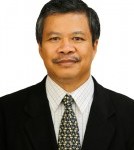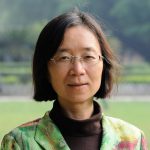
Keynote speech:
‘Missing the forest through the trees?’ Why we should care more about the imaginaries underlying tourism.
Noel B. Salazar is Research Professor in Anthropology at the University of Leuven, Belgium. He is co-editor of Tourism Imaginaries (2014, Berghahn) and the Anthropology of Tourism Book Series (Lexington) and author of Envisioning Eden (2010, Berghahn) and numerous peer-reviewed articles and book chapters on tourism and heritage. Salazar sits on the editorial boards of, among others, Annals of Tourism Research, Journal of Sustainable Tourism and Journal of Heritage Tourism. In addition, he is on UNESCO’s and UNWTO’s official roster of consultants and an expert member of the ICOMOS International Cultural Tourism Committee and the UNESCO-UNITWIN Network ‘Culture, Tourism and Development’.

Dr. Arief Yahya graduated from University of Surrey, UK (M.Sc IN Telematics) and from Padjajaran University, Indonesia (PhD in Strategic Management), was a former CEO of Indonesia Telecommunication Corporation, has received plenty of awards such as the best of regional manager of telecommunication office from Malcom Bardilge National Quality, the best Division Regional in Corporate Culture Actualization and recently awarded as a Marketer of the Year 2014 by Markplus Inc.

Keynote speech:
One Hundred Years of Cultural Tourism in Bali: An Insider’s Perspective
Prof. Dr. I Nyoman Darma Putra is head of Masters Program in Tourism Studies, Udayana University. He obtained his doctorate degree from School of Languages and Comparative Cultural Studies, University of Queensland, in 2003. His research interest include Balinese culture, cultural and heritage tourism. With Michael Hitchcock, he published Tourism,Development and Terrorism in Bali (Ashgate, 2007), and with I Gde Pitana published Pariwisata Pro-Rakyat, Meretas Jalan Mengentaskan Kemiskinan di Indonesia (Pro-People Tourism, Towards Poverty Alleviationin Indonesia) (2010). His sole author book is A Literary Mirror, Balinese Reflections on Modernity and Identity in the Twentieth Century (KITLV Press, 2011).

Title of Presentation:
The Impact of Cultural Values on Sustainable Tourism Development: Work Ethic
Prof. Dr. Komang Gde Bendesa earned his doctorate in economics at the Australian National University in 1991. He was elected dean of the economics faculty Udayana University from 1993 to 1999. In 2006, he became vice rector for academic affairs for two terms. Since 2010, he was assigned as the director of the doctoral program of tourism, Udayana University. He also serves as a regional economist for the Ministry of Finance of Indonesia.

A Changing World : Challenges to Cultural and Heritage Tourism
With a professional background in architecture and urban planning, Dr. Wiendu Nuryanti is recognized as being a prominent expert on culture, tourism and development issues in Indonesia. She most recently was Vice-Minister of Education and Culture for Cultural Affairs in the Ministry of Education (2011-2014). In that capacity, Dr. Nuryanti received the Bintang Mahaputra Utama (Medal for Outstanding Service to the Nation), Highest Class, 2014). This was presented in a ceremony by the President of Indonesia, H.E. Susilo Bambang Yudhoyono. In 2006, Prof. Nuryanti founded, and became Executive Director of, the Post Graduate Studies Program in Tourism Planning (MPAR) at Gadjah Mada University. This was the first graduate-level program in tourism planning offered in Indonesia and offers both Master’s and PhD degrees. Its principal goal is to prepare decision-makers in the public and private sectors from all regions of Indonesia to develop and implement sustainable tourism planning and development policies. In 2010, Dr. Nuryanti was appointed by the Ministry of Culture and Tourism to head the international team responsible for developing the National Fifteen Year Master Plan for Tourism Planning, Culture and Development for Indonesia (2010-2025). In 2013, in her capacity as Vice-Minister of Cultural Affairs, Dr. Nuryanti was appointed by the President of Indonesia to convene the inaugural World Cultural Forum (WCF). This was held in Bali in November, 2013 and the theme was “The Power of Culture in Development” and welcomed representatives from many countries. Among the distinguished speakers were Nobel-Laureate Amartya Sen and Faheed Zakaria, CNN Editor, Host and Commentator.
Culture & Heritage
(Room A)
|
No |
Time |
Paper |
Author(s) |
Venue |
|
1
|
15.00-15.15
|
The Implementation of Tri Hita Karana on the World Heritage of Taman Ayun and Tirta Empul Temples as Tourist Attractions in Bali |
I Wayan Ardika, MA.
|
Room A |
|
2
|
15.15-15.30
|
Between Cultural Preservation and Tourism Industry: Dialectic Relations in Cultural Heritage Tourism Management in Tanah Lot and Borobudur Indonesia |
I Ketut Surya Diarta
|
|
|
3
|
15.30-15.45
|
Developing Sustainable Tourism Strategy for World Heritage Site of Cultural Landscape of Bali Province: What issues have been addressed? |
Luh Micke Anggraini
|
|
|
4
|
15.45-16.00
|
Face Hospitality in Bali: A Pragmatic Study of Tourism Service Language |
Made Budiarsa & Yohanes Kristianto
|
|
|
5
|
16.00-16.15
|
Preservation of Traditional Music Instrument of Sasando as One Of The Cultural Heritage of Tribal Rote Society in Oebelo Village of East Nusa Tenggara |
Asep Parantika
|
|
|
6 |
16.15-16.30 |
Q & A |
Marketing
(Room B)
|
No |
Time |
Paper |
Author(s) |
Venue |
|
1
|
15.00-15.15
|
A Strategic Promotional Plan for Tourism 2019, Case study : Borobudur Temple Compounds |
Zulfiana Setyaningsih
|
Room B |
|
2
|
15.15-15.30
|
The Effect of Experiential Marketing on Visitors Behavioral Intention Through Emotion and Satisfaction (An Empirical Study on Bali Zoo, Gianyar) |
Ni Nyoman Rsi Respati
|
|
|
3
|
15.30-15.45
|
Sustaining and Marketing Community Based Agro-Tourism: Lesson Learned from Salak Sibetan Plantation in Bali |
I Gusti Agung Ayu Ambarawati
|
|
|
4
|
15.45-16.00
|
The effectiveness of Indonesian Arts and Culture Scholarship toward Cultural Tourism of Bali |
I Gusti Ayu Melistyari Dewi
|
|
|
5
|
16.00-16.15
|
Antecedents and Consequences of Smartphone Uses : the case of French tourist experience |
Mathieu Salvadore
|
|
|
6 |
16.15-16.30 |
Q & A |
Community Involvement
(Room C)
|
No |
Time |
Paper |
Author(s) |
Venue |
|
1
|
15.00-15.20
|
The Community Empowerment in the Cikapundung River as Bandung Natural Heritage |
Panji Pamungkas, Nova Riana, Septy Indrianty |
Room C |
|
2 |
15.20-15.40 |
Social Capital of Ambarjaya Community in Ecotourism Development around Gunung Gede Pangrango National Park |
E.K.S. Harini Muntasib |
|
|
3 |
15.40-16.00 |
Social capital, a framework in developing environmental education to promote community participation in tourism development of Gunung Padang Site. |
Resti Meilani |
|
|
4 |
16.00-16.20 |
Recognition of the Potential for Cultural Conservation Philosophies of Tri Hita Karana to Promote Community Participation in Batur Caldera Geopark Heritage Tourism |
Arzyana Sunkar 1 |
|
|
5 |
16.20-16.30 |
Q & A |
Destination
(Room D)
|
No |
Time |
Paper |
Author(s) |
Venue |
|
1
|
15.00-15.20
|
Agrotourism as the Economics Transformation of the Tourism Village in Bali
|
I Wayan Ruspendi Junaedi
|
Room D |
|
2
|
15.20-15.40
|
Optimization and Risk Management Model Analysis to Develop Cultural and Heritage Tourism (Case Study: Spiritual Travel in Parahyangan Agung Jagatkartta Temple in Ciapus)
|
Yuviani Kusumawardhani
|
|
|
3
|
15.40-16.00
|
The Initiation of Eco-Tourism Concept for Land Rehabilitation by Bali Botanic Garden in Lebih Village, Gianyar, Bali
|
Renata Lusilaora Siringoringo
|
|
|
4
|
16.00-16.20
|
A Framework to the Inventory of Culturally Based Products for Tourism
|
Julio Mendes 1
|
|
|
5 |
16.20-16.30 |
Q & A |
Culture & Heritage
(Room A)
|
No |
Time |
Paper |
Author(s) |
Venue |
|
1
|
16.30-16.45
|
Tourism and Preservation of Traditional Culinary Culture: Study Case of Cassava Consumption Tradition in Cireundeu Hamlet |
Adrian Agoes, Zia Kemala & Taufiq Hidayat |
Room A |
|
2
|
16.45-17.00
|
Yogyakarta Classical Dance Style Comodification on Tourist Performance in Bangsal Srimanganti Keraton Yogyakarta |
Cerry Surya Pradana
|
|
|
3
|
17.00-17.15
|
Preservation of Mangokal Holi Tradition In Batak Land as Potential Cultural Tourism |
Maidar Simanihuruk
|
|
|
4
|
17.15-17.30
|
Balinese Culture and Revisiting Tourists to Bali
|
I Ketut Sutama
|
|
|
5
|
17.30-17.45
|
Local Culinary: Tourist Attractions Vs Cultural Identity
|
Fitri Abdillah
|
|
|
6 |
17.45-18.00 |
Q & A |
Marketing
(Room B)
|
No |
Time |
Paper |
Author(s) |
Venue |
|
1
|
16.30-16.50
|
Tourist Photo Taking Behaviour and It’s Marketing Opportunity for Tourist Destination
|
Handayani Rahayuningsih
|
Room B |
|
2
|
16.50-17.10
|
Digital Marketing in Tourism: The More Global, The More Personal
|
Diah Sastri Pitanatri & I Gde Pitana
|
|
|
3 |
17.10-17.30 |
The Utilization of Social Media for Denpasar City Branding |
Febianti & Ni Luh Kurniayu Melati |
|
|
4 |
17.30-17.50 |
Satisfaction of Foreign Tourists on Cultural Tourism in Bali |
Agung Suryawan Wiranatha |
|
|
5 |
17.50-18.00 |
Q & A |
Community Involvement
(Room C)
|
No |
Time |
Paper |
Author(s) |
Venue |
|
1
|
16.30-16.45
|
Community Involvement on Caldera Toba Geopark, Case Study: Pusuk Buhit Area, Samosir Regency |
Cathelya Yosephine Hotasina Silaen
|
Room C |
|
2
|
16.45-17.00
|
Community Participation In Preserving Taman Ayun Temple As World Cultural Heritage Site |
Ni Luh Prima Kemala Dewi
|
|
|
3
|
17.00-17.15
|
Social Capital: a Basis for Community Participation in Fostering Environmental Education and the Heritage Tourism Development of Cibalay Megalithic Site |
Arzyana Sunkar 2
|
|
|
4
|
17.15-17.30
|
Assignments for Better Development of Community Based Tourism: Case study on Shirakawa-village in Gifu-prefecture |
Miki Aso
|
|
|
5
|
17.30-17.45
|
International Diaspora And Tourism: Recent Development Of European Diaspora In Ubud, Bali |
Nararya Narottama
|
|
|
6 |
17.50-18.00 |
Q & A |
Destination
(Room D)
|
No |
Time |
Paper |
Author(s) |
Venue |
|
1
|
16.30-16.45
|
Ecotourism Development Challenges In The Region Of Sentani Lake-Papua |
Yannice Luma Marnala Sitorus |
Room D |
|
2
|
16.45-17.00
|
Improvement of Ijo Temple Attraction to Implement the Concept of Nature, Based on Historical and Cultural Heritage |
Halim Ahmad |
|
|
3
|
17.00-17.15
|
The Challenge and Opportunity of Bandung as Tourism Cultural Heritage City |
Titing Kartika & Khoirul Fajri |
|
|
4
|
17.15-17.30
|
Geopark Development in Indonesia: As an Instrument to Protect our Nature and Culture |
Reza Permadi |
|
|
5
|
17.30-17.45
|
The Life Cycle of Authenticity: Neo-Nomadic Tourism Culture in Kazakhstan |
Dr Guillaume Tiberghien
|
|
|
6 |
17.50-18.00 |
Q & A |
Culture & Heritage
(Room A)
|
No |
Time |
Paper |
Author(s) |
Venue |
|
1
|
11.00-11.15
|
Sharing Creating Offering Art at Goa Gajah: Reconnecting the Temple, Cultural Heritage Site, and the Handicraft Market |
Diane Butler
|
Room A |
|
2
|
11.15-11.30
|
A comparison study of Tangible and Intangible cultures as commercialisation process of Tourism Village in Yogyakarta |
Lucia Asdra Rudwiarti
|
|
|
3
|
11.30-11.45
|
Family Inherited System and It’s Impact on the Sustainability of Local Traditional Houses in Brayut Tourism Village, Yogyakarta, Indonesia |
Purwanto Hadi
|
|
|
4
|
11.45-12.00
|
Culinary Of Lawar Bali (Social Culture, Nutrition, And Food Safety)
|
Eka Trisdayanti
|
|
|
5
|
12.00-12.15
|
Traditional homes and modern villas: imaginings of continuity and change amongst older foreigners and retirees in Ubud, Bali. |
Paul Green
|
|
|
6 |
12.15-12.30 |
Q & A |
Marketing
(Room B)
|
No |
Time |
Paper |
Author(s) |
Venue |
|
1
|
11.00-11.15
|
Intention to Visit Sacred Places, an Application of Reasoned Action Theory
|
Putu Saroyini Piartrini
|
Room B |
|
2
|
11.15-11.30
|
Tourism Promotion Strategy of Komodo National Park as A Natural World Heritage In Indonesia
|
I Ketut Surya Diarta 2
|
|
|
3
|
11.30-11.45
|
Gender Roles of Women: Analysis of Using Image of Women in Culture Tourism Online Advertisement
|
Agustina Multi Purnomo
|
|
|
4
|
11.45-12.00
|
Marketing Strategy based on Consumer Behaviour at Sanur Village Festival |
I Gusti Ayu Oka Suryawardani
|
|
|
5
|
12.00-12.15
|
Decision Determinants of Tourist’s Intention to Revisit a Coastal Tourism Object by Using ROS Model: Study case of Pulau Kelapa Dua, Kabupaten Kepulauan Seribu, DKI |
Supina
|
|
|
6 |
12.20-12.30 |
Q & A |
Destination
(Room C)
|
No |
Time |
Paper |
Author(s) |
Venue |
|
1
|
11.00-11.15
|
Development Strategy for Ecotourism Potential in Bali Botanical Garden of Candikuning Village, Baturiti, Tabanan, Bali |
I Gusti Ngurah Putu Dedy Wirawan
|
Room C |
|
2
|
11.15-11.30
|
The Potential Bali Culinary Tourism as A Cultural Tourism Attractions With Research Based Value Approach
|
I Made Bayu Wisnawa & I Ketut Sutapa
|
|
|
3
|
11.30-11.45
|
Tourism Socio Cultural Aspects: Gadjah Mada University Yogyakarta Indonesia as an Education Tourism Destination |
Henry Prihanto Nugroho
|
|
|
4
|
11.45-12.00
|
A Reflection of Bali Art Festival: Promotional Tool for Cultural Tourism in Bali |
Komang Ratih Tunjungsari
|
|
|
5
|
12.00-12.15
|
Participation of Balinese People Toward Tourism: Can Government and Tourism Industries Affect Participation? |
I Putu Eka N. Kencana
|
|
|
6 |
12.15-12.30 |
Q & A |
Destination
(Room D)
|
No |
Time |
Paper |
Author(s) |
Venue |
|
1
|
11.00-11.20
|
The Process of Making Tempe Benguk as A Tourist Attraction in Kulon Progo Regency, Yogyakarta
|
Dhanik Puspita Sari
|
Room D |
|
2
|
11.20-11.40
|
Integrated Vedic Agriculture and Tourism in Bali
|
I Gede Setiawan Adi Putra |
|
|
3
|
11.40-12.00
|
Heritage Tour Package Development Model in Syiva Plateau in order Supports Prambanan as a UNESCO World Heritage
|
Fahmi Prihantoro & Ghifari Yuristiadhi
|
|
|
4
|
12.00-12.20
|
Development Strategy Of Balinese Traditional Culinary As Form Of Cultural Tourism (Case At Hotels In Sanur Tourism Region, Bali, Indonesia)
|
Made Antara
|
|
|
5 |
12.20-12.30 |
Q & A |
Destination
(Room A)
|
No |
Time |
Paper |
Author(s) |
Venue |
|
1
|
13.30-13.45
|
The Green Hotel Programme in Denpasar City, Bali (Indonesia): What Does It Mean for Bali as A Cultural Tourist Destination? |
Anak Agung Gde Raka Dalem
|
Room A |
|
2
|
13.45-14.00
|
Mepantigan as a Sustainable Tourism Family Package
|
I Gde Agus Jaya Sadguna
|
|
|
3
|
14.00-14.15
|
Glocalization of Balinese Culinary as a Representation of Cultural Tourism in Hospitality Industry in Bali |
I Ketut Surata
|
|
|
4
|
14.15-14.30
|
Destination Competitiveness for Rural Tourism Development in Wanayasa, Puwakarta, West Java, Indonesia |
Annisa Pratiwi
|
|
|
5
|
14.30-14.45
|
The image of Bali Tourism Destinations in Global Competitiveness
|
I Nyoman Sudiarta
|
|
|
6 |
14.45-15.00 |
Q & A |
Destination
(Room B)
|
No |
Time |
Paper |
Author(s) |
Venue |
|
1
|
13.30-13.45
|
Best Practices of Heritage Tourism and Culinary in A Kampong
|
Kun Aniroh Muhrofi-G |
Room B |
|
2
|
13.45-14.00
|
The Influence of Traditional Culinary Industry in the Development of Tourism in Lopati Village, Yogyakarta
|
Vincentia Reni Vitasurya & Anna Pudianti
|
|
|
3
|
14.00-14.15
|
Effectiveness of Local Institutions as the Basis of Sustainable Tourism Village |
Widhianthini
|
|
|
4
|
14.15-14.30
|
The Balinese Hospitality: Study of Texts and Tradition (It’s Relevance to Tourism Industry in Bali) |
Ida Anuraga Nirmalayani
|
|
|
5
|
14.30-14.45
|
Exploring Guliang Kangin Village’s Tourism Potentials for Sustainability Livelihood and Diversification Tourism Destination in Bangli Regency. |
I Made Sarjana
|
|
|
6 |
14.45-15.00 |
Q & A |
Destination
(Room C)
|
No |
Time |
Paper |
Author(s) |
Venue |
|
1
|
13.30-13.45
|
Exposing International Students to Social Entrepreneurship Concepts Enriched with Balinese Cultural Experience
|
Putu Chris Susanto & Ni Luh Christine P. Suyasa
|
Room C |
|
2
|
13.45-14.00
|
Solid Waste Management Supports Sustainable Tourism In Bali
|
I Made Sudarma
|
|
|
3
|
14.00-14.15
|
The Existence of Cianjur Traditional Culinary (CTC) in View of Tourists |
Muchrodji
|
|
|
4
|
14.15-14.30
|
Myth, a local wisdom to maintain the sustainability of tourism Destination in Bali (Case Study Jatiluwih and Sangeh) |
Ni Nyoman Sri Aryanti
|
|
|
5
|
14.30-14.45
|
Development and Conservational Role of Recreation in Marine Protected Areas: The case study Gili Trawangan, Indonesia |
Vladimir Cirjakovic
|
|
|
6 |
14.45-15.00 |
Q & A |
Marketing
(Room D)
|
No |
Time |
Paper |
Author(s) |
Venue |
|
1
|
13.30-13.50
|
Strategic Branding Of Tourism Bali Based On Culture And Heritage
|
Ni Ketut Arismayanti
|
Room D |
|
2
|
13.50-14.10
|
The Establishment of Indonesian Tourism Authority Board: a Legal and Cultural Perspectives
|
I Nyoman Suyatna & I Made Budi Arsika
|
|
|
3
|
14.10-14.30
|
Incorporating the Concept of Sustainable Tourism into the Regulations of Cultural and Heritage Tourism in Indonesia
|
Ni Gusti Ayu Dyah Satyawati & I Gusti Ngurah Wairocana
|
|
|
4
|
14.30-14.50
|
Family Foundation, Is It An Innovative Strategy? The Case of Cultural Heritage Tourism in Toraja, Indonesia
|
Ilham Junaid, Herry Rachmat Widjadja, & Hamsu Hanafi
|
|
|
6 |
14.50-15.00 |
Q & A |
|

Title of Presentation:
Designing Tourism Experiences for Millennials
a joint presentation with Dr Sarah Gardiner
Professor Noel Scott is the Deputy Director, Griffith Institute for Tourism at Griffith University, Gold Coast, Australia. His research interests include the study of tourism experiences, destination management and marketing, and stakeholder organization. He is a frequent speaker at international academic and industry conferences. He has over 210 academic articles published including 13 books. He has supervised 19 doctoral students to successful completion of their theses. He is on the Editorial Board of 10 journals, a member of the International Association of China Tourism Scholars and a Fellow of the Council for Australasian Tourism and Hospitality Education. Prior to starting his academic career in 2001, Noel worked as a senior manager in a variety of businesses including as Manager Research and Strategic Services at Tourism and Conferences Queensland.

Title of Presentation:
Lifestyle Tourism Entrepreneurs and Their Social Responsibilities
Professor Xu Honggang is a lecturer at Sun Yat Sen University and vice Chairman of China Tourism Geography Commission. She obtained PhD from Asian Institute of Technology, Thailand. She is an international well known tourism scholar and obtained Roy Wolfe Award from Tourism Commission of American Geography Association for contribution. She is key expert in Monitoring Center for UNWTO Sustainable Tourism Observatories (MCSTO). She has participated in many tourism consultant projects for China National Tourism Authority (CNTA), including the national criteria of ecotourism tourism attractions and the national criteria of demonstration cities of leisure and tourism.

Title of Presentation:
How Millennials Re-shape the Travel Industry of Indonesia
His expertise includes Online Travel agent (OTA), B2B and B2C distribution channels, business development, e-marketing, yield management, team management & development, key account management, crisis management, management of overseas offices. He has got in-depth knowledge of the hotel industry in South-East Asia, India, Indian Ocean & South Africa.
His specialties include: team leadership, team management, KPI management, data analysis, hotel contracting, negotiations, liaison with governments, consulting, online marketing, and business development.

Dr. Chris Bottrill is the elected Chair of PATA (Pacific Asia Travel Association), a Trustee of the PATA Foundation, and the current Director, International at Capilano University, Canada. Chris has a broad background of academic and applied experiences. He has been a Dean of three Faculties and taught in a wide array tourism, business, and adventure management fields in universities in Canada, New Zealand, USA and Austria, and he has completed over 50 tourism development projects around the globe. His current and recent activities include directing the acclaimed Capilano University and Hanoi Open University Vietnam Community Tourism project aimed at protecting ethnic hill tribe culture through tourism, leading a Pacific Asia study on Indigenous Tourism and Human Rights, and as Chair of PATA’s human capital development committee, designing and facilitating seven youth symposiums with over 20 universities in the Asia Pacific over the past four years. Chris has presented on tourism related topics at conferences and forums in China, Canada, USA, Russia, Finland, Vietnam, Malaysia, Korea, Cambodia, India, and New Zealand.